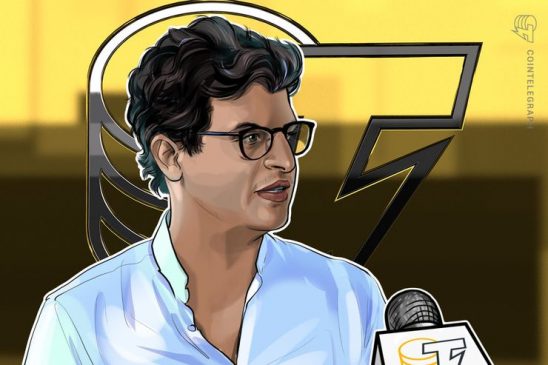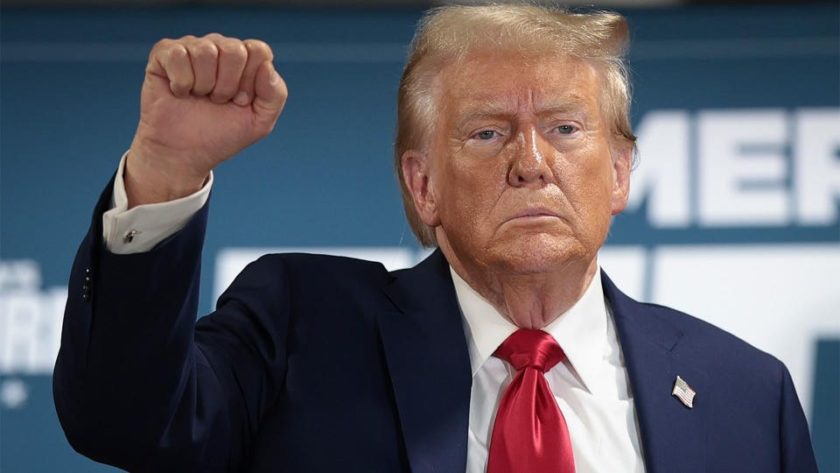Cointelegraph recently had the chance to speak with Pierre-Edouard Wahl, the head of blockchain digital services at PwC Switzerland, about the future potential of blockchain in the country.
Wahl, who noted that PwC Switzerland worked closely with main Swiss stock exchange SIX on their announcement of a future distributed ledger-based digital asset exchange, elaborated on his beliefs that crypto must be used in order to go mainstream enough to give people back control of their digital footprints.
This interview has been edited and condensed.
Molly Jane: Could you tell us how you got interested in the blockchain and cryptocurrency space?
Pierre-Edouard Wahl: I’m an engineer by schooling. I’ve been in the blockchain space for several years now, and I discovered a Bitcoin community that was very ideologically driven. The community drove me to the technology, not the other way around.
And so I decided to start a B2B Bitcoin exchange and got into some trouble, because at that time, it was very difficult. There was no clear regulation around exchange operations, and I looked for a big banking partner. Unfortunately, at the time, every time you mentioned Bitcoin, there were closed doors — so that did not work out.
But Credit Suisse asked me if I was willing to jumpstart their blockchain department, so I happily did. I spent three years at Credit Suisse and after that left, thought I was going to get back to the startup world, but really thought I had an opportunity at PwC to make an even bigger difference than in the startup world. Because we have a reach that is pretty amazing — a very high level of established business, executive suite. So, yeah, that was the exciting part.
MJ: When did you first hear about cryptocurrencies?
PW: The first time I heard about Bitcoin was in 2010. I dabbled with Bitcoin really for the first time in 2011, and got into the space full-time in 2012.
I feel like it is an industry that has such a huge potential, and I wish I could have spent more time there. But yes, relative to the existence of this industry, I have been there for a while.
MJ: Do you actually invest in the industry, do you own Bitcoin?
PW: I am fully invested. I’ve asked my employers to pay me in crypto, but it hasn’t really worked yet.
I don’t only talk the walk, I try to walk the talk.
MJ: Since you say you have been investing in the market for a while, have you ever bought anything with Bitcoin? Like a pizza?
PW: I try to spend Bitcoin wherever I can. I see it as a way to spread the cost. So, yes, I have spent Bitcoin.
In the meetup in San Francisco — the SF Bitcoin-dev meetup — we used to organize what we call “Bitcoin bombs.” All of the participants go to a bar and ask if we can pay in crypto, in Bitcoin — and if we couldn’t, we could go to the next bar, until we found the first one that would accept it.
MJ: So how long did it take you to find a bar that would accept Bitcoin?
PW: San Francisco is pretty open, so generally it went pretty quickly. And we were a crowd, so they had a good incentive. And at that time, there was already BitPay, so if they wanted to receive dollars, they could easily get their dollars rather than Bitcoin.
MJ: Do you have any fear that in the next 10 years Bitcoin will go to a million, and you’ll be that guy that spent his Bitcoin on a cocktail?
PW: Well, it will only go to a million if it gets used. So, it’s cool if the price goes up to a million, but it is not my priority. My priority, really, is to try to support a world where people have more sovereignty over their digital footprints, have more sovereignty in terms of freedom of speech, freedom of movement.
And public blockchains need a token for incentivizing various parties, and if one of those tokens goes to a million of dollars, it’s great for the investors and those tokens. But the million dollars is not the end goal — the million dollars is just the means to an end.
You can watch the interview here:
MJ: Switzerland’s main stock exchange, SIX, recently announced that they would be launching a “fully regulated” cryptocurrency exchange next year. Could you talk about PwC Switzerland’s role in the announcement?
PW: We’ve been involved in that project and are very proud to be a partner in this new adventure for SIX. We hope that it is going to have impact not only on the Swiss financial place, but really on the global level.
I hope other jurisdictions will follow, if they do not precede us — it is possible that a few jurisdictions will launch on their own, I’d say, major exchanges, before we actually launch ours. But we are really excited about it. We think that it will definitely provide much easier access to the institutional investors. And we can’t — I can’t — wait to see it happen.
MJ: Are you expecting a lot of enthusiasm and energy from the Swiss community for SIX’s digital asset exchange?
PW: This project grew from demand from the industry. There was a lack of infrastructure in our financial service industry — like big banks, small banks — and a lot of demand from their clients. So it really came from the clients themselves who wanted to get into the space.
SIX basically belongs to the banks here in Switzerland, so it wouldn’t have happened without their approval — or the announcement wouldn’t have happened — without the approval of the major stakeholders and the major banks in Switzerland.
MJ: Do you think that SIX opening a digital asset exchange in Switzerland will help the country embrace more blockchain companies?
PW: Oh, we definitely hope so. Whether it will or not, I do not know. But hopefully banks will be more enabled with more infrastructure to actually start handling those new asset types. I do expect so, but I do not know for sure.
Right now, I think there is still more clarity needed from the regulators in order for banks to start jumping into it. Banks don’t necessarily have the right incentives to jump into space. Some obviously will find the right incentives, but I think banks have to start — rather than thinking in terms of efficiency gains — thinking in terms of new business models with this technology.
MJ: A Moody’s report from this spring found that Switzerland’s banking industry could be hurt by blockchain, due to the technology’s ability to make cross-border transactions faster and cheaper. Do you see a dichotomy in Switzerland embracing this new technology that has the potential to hurt its banking industry?
PW: I think that, on the contrary, it can boost up business. Then, the fees can be whatever the fees they decide to apply, as long as they are fair. And there is going to be competition amongst various parties who want to provide those kinds of services.
I actually think it will be an enabler. Yes, it might hurt their existing business, but that is often the case with the new technologies: It’s either you adopt them and you think differently about how those technologies are going to actually offer new solutions — as well as improve the existing solutions — or then you just look at the improvements, and we are all racing to the bottom, because there are less and less margins for everyone.
MJ: Could you tell me about what PwC Switzerland does with blockchain?
PW: We have a pretty broad service offering. We work with startups, we work with established companies. We offer — I wouldn’t say full loaded, yet, because there’s still, once again, a lack of clarity — but we do offer first inspections to ensure that things have been done correctly. And hopefully that will enable us to do audits, if the regulators allow us to do that by the end of the year.
We also work on the infrastructure level, we work with a lot of ICOs globally that want to come to Switzerland, from clients that are all around the world. I think we have a pretty broad offering: We offer legal tax services, insuring services, engineering services, some kind of review for code — I do not like the word audit there, because audit it makes that sound like it is bulletproof, which it isn’t. It’s just reviewed by another pair of eyes. And we are trying to grow our services.
MJ: I’ve heard that Switzerland has been increasing regulation for ICOs to make it harder to hold one in Switzerland. What do you think are the benefits that ICOs bring to the blockchain space?
PW: So, you are definitely right. Increasing, yes.
When it starts from nothing, it will increase.
I think there is very little regulation here in Switzerland, but there are guidelines that are good — I think they are not great yet, personally. I think there is a lot of confusion between utility tokens and payment tokens.
For me, the difference is that utility tokens with enough liquidity can became payment tokens. But there is clarity between asset-backed tokens and the other type of tokens, and I think there is going to be more and more ICOs that use the asset-backed classification.
I think that is excellent for industry — the blockchain industry — but also for the existing industry. It’s much more efficient to do an ICO with a security token instead of an IPO — or as a way to raise funding in a VC round or seed round.
Unfortunately, there has been a lot of hype. The space is definitely not mature yet, and it needs a lot more cooperation between the various developers to establish standards in order to have new experimentations in the ICO space.
I think a lot of the fund distribution should not happen immediately after the ICO, but there should be some kind of the smart-contract thing or possibility to enable some kind of cliff for the delivery of the funds, based on accomplishments. Vitalik [Buterin] proposed the DAICO — I think that goes in the right direction — it’s definitely not perfect, but I think it’s in the right direction, for sure. I think there’s a lot more to do in the ICO space for it to be right.
MJ: Could you expand more on how the DAICO works?
PW: The DAICO concept is — on a very, very basic level — enabling the token holders to vote on the release of funds in order to get back some control to the investors. And if they are not happy, they can vote against the release of funds and recover whatever Ether has been locked into the smart contract.
MJ: Zug recently held a trial municipal vote on the blockchain. Do you think that blockchain voting will become more widespread in the future?
PW: I think, conceptually, it is an interesting experiment. I am still not convinced that blockchains are the right platforms for voting. I think there is something really interesting about voting on blockchains, but I think the exciting parts are really the cryptography, the kind of pseudo-anonymity that you have.
But I think you need to be able to analyze your constituents’ votes. So I see voting on the blockchain more as a small-scale, board meeting kind of vote, rather than a national way of voting. I would expect more temper-proof, black boxes that record the votes, leveraging some kind of cryptography from all the participants and, at least, you can do a lot of querying on the data — because you want to know who’s happy, who’s unhappy and categorize your voters in order to better categorize how to respond.
MJ: As someone who has been in the space for almost 10 years, you mentioned that going from no regulation to some guidelines is already a step. How else have you seen regulation change in general?
PW: I may have a very biased version of things, because I was in San Francisco in the earlier days, but I feel like a lot of people have been waiting for New York to come out with some guidelines because they are such a big weight on the international markets. And I think it was Ben Lawsky who came out with BitLicense and things just trickled after that. There were jurisdictions that were more open about blockchain-based tokens, but they were kind of shy — I would say, not really very clear in public about their stance. So, I would say the BitLicense was probably the beginning of the dominos falling, or the beginning of the chain effect.
MJ: Do you think other countries are going to take the cue from the BitLicense?
PW: Well, I think countries that are afraid can always use BitLicense as a reference, and countries that are more embracing can do better. But I definitely think it can serve as a benchmark, unfortunately. New York has such a big weight in the financial industry globally that people have to take that into account what is the U.S. says.
MJ: What would be your example of the right kind of regulations for cryptocurrencies?
PW: The right kind of regulation? I think that it is early to say what’s right and what’s wrong. I think the right approach, rather than the right regulation, would be to embrace the community.
I really admire the Swiss regulators, which went on a road show — I had never seen that before. And I’d encourage many other regulators around the world to really go on a road show, talk to the community members, try to understand as much as possible, what is happening with not only tokens, but with the smart contracts — because most of the regulation right now is around tokens.
The real novelty, I think, is more the smart contracts, the immutability — tokens have existed forever: The gold-backed dollar was not gold, it was backed by gold. Shares are backed by the companies. So these are all some form of tokens, so tokens are not new. The novelty is that with blockchains: They’re easy to issue and they’re very divisible, very transparent and they have a lot of new properties.
So I would urge regulators to look a little bit more closely at the actual code, because we are building a jurisdiction where code is law, and these jurisdictions in cyberspace will live and will survive in any physical jurisdiction. And the regulators will have to regulate the interactions of those cyber-incorporated entities within their jurisdiction. And I think we are still very far from that mindset, when it comes to regulators — where we are just looking at what is in front of us — i.e., the tokens.
MJ: A lot of people think that cryptocurrency mining has a negative environmental impact because of how much energy it uses. Does PwC Switzerland need to think about the energy aspect of promoting blockchain?
PW: At PwC, we are blockchain agnostic. A consensus mechanism is a consensus mechanism — and we don’t really care, we just care for it to be secure. And so I would agree that there is an impact on the environment, and that is an undeniable fact.
Now, I really don’t think it is a waste of energy. I think this energy is put to guarantee immutability. I’m eager to see better consensus mechanisms. The one thing I like with proof-of-work is it that it uses energy as a part of the consensus mechanism and, therefore, you can participate in the consensus mechanism wherever you are. It is independent of your stake, you can go to the North Pole and you have access to energy, and you can go to the Sahara Desert and you still have access to energy. I think that it is an interesting approach to keep it as decentralized as it can be.
MJ: Thank you!
PW: Thank you.




